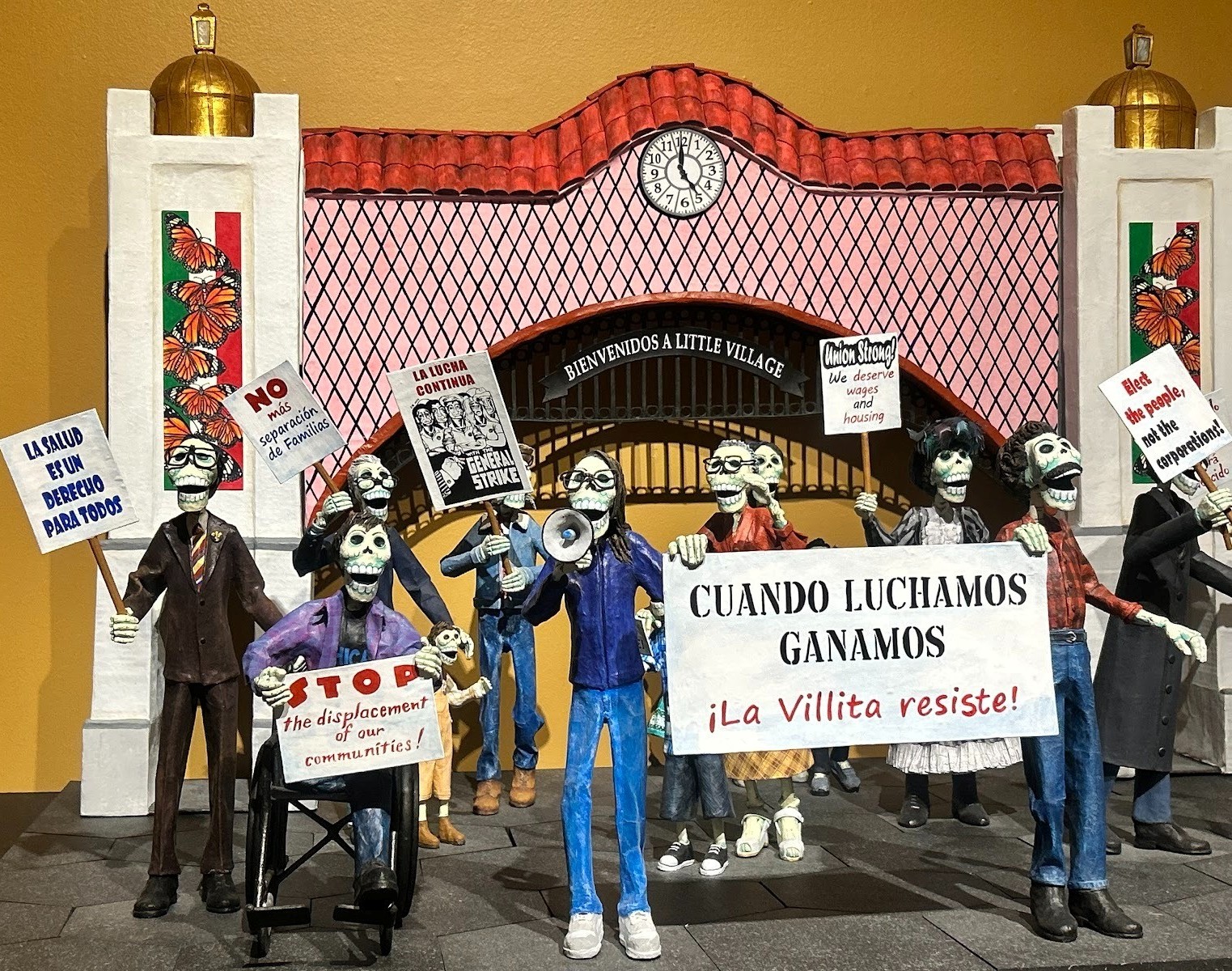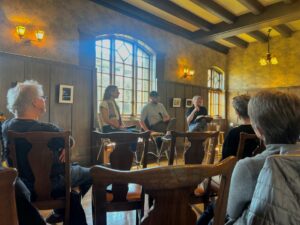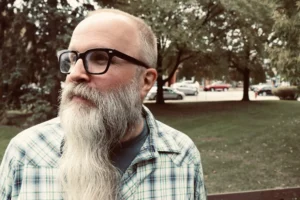Dave Hofer holds a cassette tape and takes out the insert, along with the plastic tape itself. Flattening the paper-thin artwork — which has the name of some long-forgotten band from Lombard or Elgin or Rosemont — he puts it on a scanner and begins his process.
Front cover, scan. Inside front cover, scan. Inside credits, scan.
After this process, he then goes on to digitize the music on the tape to add to his ever-growing online archive.
Hofer is the founder and sole force behind DuPage County Hardcore, a vast music catalog of independent bands and artists from the greater Chicagoland area. Currently operating on the music distribution and streaming website Bandcamp, the archive is packed with over a thousand releases from punk, metal and hip-hop artists, with release dates ranging from the 1970s through the 2010s.
Hofer dives into the beginnings of his archive, his work process, his thoughts on the recent resurgence of a late 90s screamo band, the Lazarus Plot and what his archive means in the grander scheme of time.
What is DuPage County Hardcore and why did you start it?
It’s an online community archive of out-of-print, or previously unavailable, punk and punk-adjacent music. [In terms of starting it], it wasn’t really calculated. I used to write for a magazine called Punk Planet and did a fair bit of freelance writing. Before I finally invested in a digital recorder, I would do a lot of phone interviews, so I had a gigantic cassette recorder that I would be able to plug into the headset of our landline, so we could get these crystal clear recordings. Did that for years and just had a bunch of these tapes; I was just like, “What are we going to do with these? I’m never gonna listen to these things.” I didn’t want to just throw them in the garbage, so I asked a friend of mine who has the technical know-how, circa 2012 or something. He made a very nice tutorial for me and we may have even gotten together at one point and walked through it or something. I just started digitizing these old interviews just to declutter and get rid of all those tapes.
When I look at DuPage County Hardcore, I see over 1000 releases. How do you find all of this music?
The foundation of it was all stuff from my personal collection. I have always been pretty active in bands and writing for zines and just being out there doing stuff. I would save my friends and acquaintances demo tapes and CDRs and stuff. It’s funny, I hadn’t really thought about this, but part of that foundation that I started the project with was because over the years when things were a little more lean, I would go to Reckless [Records] and sell back a bunch of CDs or whatever; I would never bring in the hyper-local stuff, because, from a secondary market perspective, it’s like, who the fuck has ever heard of whatever band from Glen Ellyn that put out this random tape? You wouldn’t get any money for it if you were trying to sell it. A lot of people have been very generous, either just sending me stuff or lending me things. There’s a demo by this band called Slaphappy, which is Bob Nanna from Braid. I got a text or an email or something from Rob [Sevier] and he ended up with some tapes that I think used to be an ex-girlfriend’s or something and he was like, “I’ve got this Slaphappy demo. I think it would be a good thing for your page.”
What were some of your highs and lows at the beginning of the archive in terms of your process?
It was kind of great revisiting some of the stuff, you know, because I’m not just going to sit around and listen to my band’s demo from 1996 every day. That also kind of extends to when scanning the artwork and stuff; that is probably the first time in a long time, if not the first time ever, that I really scrutinized some of the liner notes and the little tidbits of some of the artwork. In terms of things that I learned, I mean, that could be a book. Where do you even begin? I mean, I guess the best way to say this is I recently embarked on a file cleanup project, like the music files and the artwork. I was very inconsistent in the beginning in terms of how I scan everything. If I have the physical object, I’ll scan the front cover, back cover, both sides of the tape, if there’s something on either side and all the artwork. When I started looking at doing this file cleanup, some things only had the cover and some things would have the back cover, but I skipped the insert for some reason, the metadata for the audio files was terrible. I was also using WAV files, so I’ve switched that. Just all little technical stuff like that.
Your archive not only showcases the vast amount of releases, but it also goes to show how much work you put into it. Where do you get your work ethic from?
Maybe because I’m mostly German, that might be it. I’ve noticed over the years that there are some people that are very good ‘idea’ people but never act on them for whatever reason; it could be that they don’t have the time or they don’t have the energy. It’s not necessarily a fault, but there are people that have always had great ideas and then not great execution. I don’t know, I’ve always just kind of had a high energy level. I should probably be on medication, but it’s just kind of how I’m wired, and that’s tempered over the years. Of course, as you get older, you slow down. At one point in my life, I was in, like, three bands, had a job, was in community college, was dating this girl that was very exhausting and now I’m like, “Oh my god. How did I even do all of that?”
Recently, the Lazarus Plot has gotten this little resurgence among younger generations. How did you react to them getting picked up by the Numero Group and getting more attention?
I think it’s great! When they were a band, I was aware of them, but it was never really my style. I was always into death metal and grindcore; those were my two heavy subgenres. The whole screamo thing — I didn’t hate it, but it would tend to lose me a little bit. Then again, the band I Hate Myself from Florida — I love that band! Nothing is a blanket statement; it’s just a matter of personal taste. [The Lazarus Plot] is a good band and they’re great people. It’s nice to see a band not as recognized as they should’ve been [get recognition]. They’re the type of people that were not exactly striving for recognition; they were just making art. I’m not going to speak for them, but I feel like that’s pretty accurate. It’s nice to see nice people that made good music get some recognition, even if it’s posthumous. I’ve known Simon [Czerwinskyj] and Kenny [Rasmussen from the Lazarus Plot] for a really long time. They’re great people and it’s cool that they’re getting some love. I don’t really see a downside to it.
In the grander scheme of time, do you think what you do is important?
I guess I kind of have to say yes, because nobody else is doing it. The main point of the project was to centralize everything, because a ton of the shit is probably on YouTube. In terms of the Chicagoland area, like everything all in one place, that to me is the most important thing about it; it’s kind of a one-stop shop. I guess beauty is in the eye of the beholder, you know what I mean? I’m sure bands on there that people were in might cringe when they [listen] like, “Oh, God, this thing is still like, kicking around?” I’ve never been shy about discussing that it’s essentially a bootleg project. I don’t have the copyright to any of this stuff, but I can acquiesce that it’s “important” because the response to it has been nearly universally positive. People are happy to be remembered. I had somebody write recently that wanted to send me some stuff and was like, “Dude, you have a demo from my old band [on] there. That is incredible.” There are some times where people will write to me and want their demo or whatever included on there not as a measure of success, but they want to be part of the scene or the page. It seems important to other people that their music has not been forgotten or kicked to the curb, you know. It’s all about the music.
You can check out DuPage County Hardcore here to scroll the archive.
















Be First to Comment